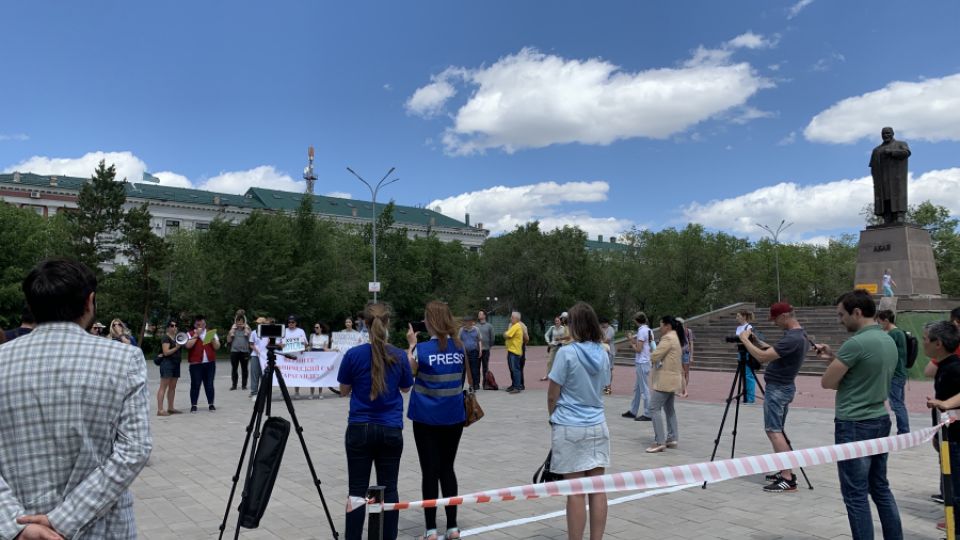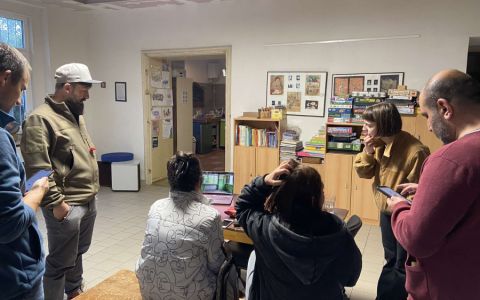On June 11, citizens of Karaganda attended an environmental rally – the first environmental protest in the city’s history. What brought the people there? Their joint will to return the Karaganda botanical garden, where people used to relax and spend their free time, back to the city. For years, a place that has been sold out to private stakeholders. The protest has raised the question of where citizens and authorities should draw a line between public and private spaces in Kazakhstan.
Karaganda residents still remember those times when almost every wedding ceremony in the city was not complete without a photo shoot in the birch grove of the botanical garden. People used to enjoy picnics in its shady alleys on hot summer days, and children used to collect acorns for handicrafts in the fall season there. The public began losing control over the garden’s future in 1996. That year, authorities removed it from the category of protected area. Twenty years later, the territory of the botanical garden has been divided into several sectors with various purposes, e.g., the construction of luxurious settlements. A significant part of the land belongs to Phytochemistry holding, a pharmaceutical company. In 2007, 6.77 hectares of botanical garden land were sold for three dollars per square meter.
Information that the city authorities allowed the rally appeared in media and social networks approximately a month before the event. Many citizens welcomed this decision, announcing their will to join the protest. In the end, roughly forty people participated in the rally. The gathered citizens supported local activists to protect Karaganda residents’ rights to live in a healthy and pleasant environment. Some participants came with banners demanding the return of the botanical garden to Karaganda. One of the residents unfurled a poster saying: “The land and its subsoil, water, flora and fauna, and other natural resources belong to the people. On behalf of the people, the state exercises the right of ownership.” Men in civilian clothes immediately asked the person to remove the president’s quote without explaining why it contradicts the rally’s theme.
People from the EcoMuseum and the Czech NGO Arnika Association joined the event as observers. “ Events like this should sparkle the discussion about urban planning in Karaganda. The city has lost a lot of trees over the past 30 years. Compared to other cities, the environment in Karaganda is in worse shape. Part of the problem is that a national property like the botanical garden, a specially protected area, was transferred to private ownership. Although there are ways, even without changing the owner of the territories, to impose protected regimes and make the owners care about their property. Another vital green area adjacent to the botanical garden is our city park. We need to discuss its future with representatives of the state, residents, and civil society organizations,” said Dmitriy Kalmykov, the director of the EcoMuseum.
At the end of the rally, the organizers read a resolution demanding regional and city authorities to investigate the legality of the botanical garden’s liquidation, unreasonably low land sale price, and reconsider the urban development. The participants proposed to establish a public initiative to restore the garden on its former territory or in another place, to create a board of trustees from experts and public activists to protect the precious green area. As the organizers said, they will post the appeal on the website as an online petition to collect signatures. “The citizens of Karaganda are beginning to realize the importance of greenery in the city, which creates “green islands” suitable for relaxation and simultaneously mitigates the effects of climate change. Unfortunately, Kazakhstan as a whole, and the Karaganda region, are very vulnerable in terms of climate change,” concludes Jiri Vidiecan, the project coordinator from Arnika.









